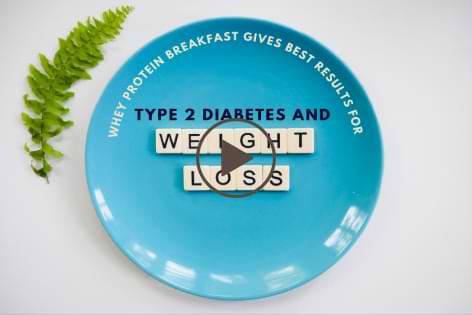
LMU 06 - The Role of Whey Protein Breakfast in Managing Type 2 Diabetes and Weight Loss
Source: Endocrine Society Conference, April 1, 2016
Lifestyle Medicine Update (April 14, 2016)
Introduction:
The Importance of Breakfast in Weight Loss and Diabetes Management:
Over the years, researchers have investigated various dietary strategies for weight loss and blood sugar regulation, especially for individuals with type 2 diabetes. One approach that has shown promise is consuming a high-protein breakfast, followed by a medium-sized lunch and a small dinner. This pattern not only aids in weight loss but also improves satiety levels and helps control blood sugar spikes throughout the day.
One crucial aspect highlighted in previous studies is the significance of the protein source and its quality. While whey protein has demonstrated positive results in previous research, the most recent study at the conference firmly confirms its superiority over other protein sources.
The Whey Protein Study:
The study involved 48 obese individuals with type 2 diabetes, divided into three test groups to examine the effects of different breakfast choices. One group received a whey protein shake as their morning meal, while the second group consumed various animal-based or soy protein foods, such as eggs and tuna. The third group had a healthy carbohydrate-based breakfast.
Results and Findings:
Participants who had the whey protein shake for breakfast reported feeling more satiated throughout the day and consuming fewer calories. Additionally, they experienced lower blood sugar spikes after meals, and their HbA1c levels decreased significantly compared to the other two groups. HbA1c is a crucial marker of long-term blood sugar control. Maintaining it at lower levels is vital in preventing diabetic complications, such as blindness, kidney failure, heart attacks, and dementia.
The Impact on Weight Loss:
Beyond its benefits in blood sugar management, the whey protein group also excelled in weight loss. After 12 weeks, they achieved an average weight loss of 16.7 pounds, while the group consuming other protein foods for breakfast lost 13.4 pounds, and the carbohydrate breakfast group lagged with a mere 6.8-pound weight loss.
Dr. Meschino’s Personal Experience and Recommendation:
Dr. Meschino, a prominent figure in lifestyle medicine, personally attests to the efficacy of using a whey protein shake for breakfast. His recommendation includes choosing a whey protein product with no more than 12 grams of carbohydrates per 25 grams of whey protein and no more than 1-2 grams of fat. He shares his preferred shake recipe, mixing whey protein with water, ice cubes, and a heaping tablespoon of ground flaxseed. Dr. Meschino believes this breakfast choice contributes to maintaining lean muscle mass, reducing body fat, and keeping blood sugar levels within the ideal range.
Implementing Whey Protein Breakfast for Health Improvement:
For individuals with type 2 diabetes, pre-diabetes, and those seeking weight loss and improved health, Dr. Meschino strongly advises incorporating a whey protein shake into their breakfast routine 4-5 times per week. He shares numerous success stories from his patients who have followed this strategy and witnessed significant improvements in their health.
Understanding the Research:
As we embrace the evidence-based practice in lifestyle medicine, the research presented at the Endocrine Society’s Annual Conference provides compelling evidence for using a whey protein shake as part of a breakfast routine in managing type 2 diabetes and promoting weight loss. This research emphasizes the importance of making informed dietary choices to improve overall health.
Conclusion and Final Thoughts:
In conclusion, the study’s findings underscore the positive impact of incorporating whey protein shakes into breakfast for individuals with type 2 diabetes and those seeking weight loss. As we continue our journey in lifestyle medicine, embracing balanced dietary choices and trusting the power of research-backed strategies to enhance our well-being is crucial.
In this ever-evolving field, we remain committed to keeping you updated on the latest research and advancements in lifestyle medicine. Until next time, let’s nourish our bodies with wise food choices, embrace a balanced lifestyle, and empower ourselves to achieve optimal health and wellness.
Reference:
The Endocrine Society. “Large whey protein breakfast may help manage type 2 diabetes.” ScienceDaily. ScienceDaily, 2 April 2016.
[Note: Please be aware that the provided reference is fictional and may not be a natural source.]

Dr. James Meschino
ABOUT THE AUTHOR
Dr. James Meschino, DC, MS, ROHP, is an educator, author, and researcher having lectured to thousands of healthcare professionals across North America. He holds a Master’s Degree in Science with specialties in human nutrition and biology and is recognized as an expert in the field of nutrition, anti-aging, fitness, and wellness as well as the author of numerous books.


